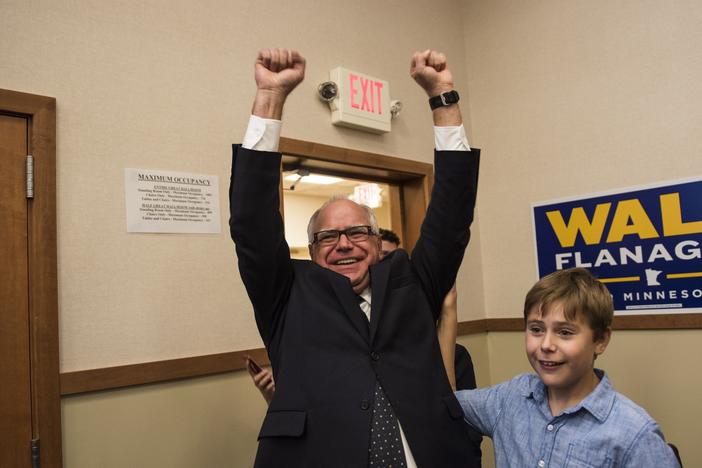Section Branding
Header Content
Tim Walz made an impression in China, students and teachers say
Primary Content
BEIJING — When Vice President Harris picked Minnesota Gov. Tim Walz as her running mate on the Democratic ticket earlier this month, a Chinese woman in Western Australia, thousands of miles away, couldn't contain her excitement, shouting with joy at the news.
“When I realized that he was the Tim that [was] in my memory, I was amazed, and felt so proud of him,” Christy Dai told NPR by phone from Perth.
In 1989, a 15-year-old Dai met Walz, who became her first foreign English teacher at Foshan No. 1 Middle School in southern China. During that school year, Walz taught English and U.S. history to around 300 students, she says.
For Walz, it was an introduction to a country that he would return to about 30 times in the ensuing years, by his own reckoning — a cumulative experience that has come under a spotlight since his addition to the Democratic ticket.
But Walz’s record on China, based on the accounts of people who interacted with him on some of those trips, as well as his own words, is hard to put in a box.
At the age of 25, fresh out of college, Walz signed up for Harvard University's WorldTeach program and traveled to China, where, according to his online biography, he became part of one of the “first government sanctioned groups of American educators” to arrive after the country opened its doors to the world in the 1980s. The ’89-’90 school year started shortly after the Chinese army crushed pro-democracy protests centered on Beijing’s Tiananmen Square in June 1989.
“It was my belief at that time that diplomacy was going to happen on many levels, certainly people to people,” Walz recalled during a 2014 congressional hearing commemorating the 25th anniversary of the Tiananmen crackdown. “The opportunity to be in a Chinese high school at that critical time seemed to me to be really important.”
People-to-people communication
At the high school in Foshan, Walz made a good impression, according to Dai and a former colleague.
“He was quite lively and very approachable. Whether people understand English or not, he always greets them with hand gestures, appearing friendly and cheerful,” says Lee Nai-Tim, a retired teacher of Chinese language and literature, who was in charge of a class when Walz was teaching there.
Walz was given the nickname “Ah-Tim” by his students and colleagues. In Cantonese, the word “Tim” can be represented by a Chinese character that also appeared in Lee's name. Lee recalled Walz, with a big smile, saying in Cantonese: "Both you and I are named Tim."
Lee says Walz was thoughtful and cared for others. Walz was the only teacher at the school who was provided with an air conditioner, but he often left it off.
“At that time, our electricity supply was sometimes unreliable,” Lee says. “Mr. Walz would turn off his air conditioner because when he used it, the lights nearby would dim. It was very hot in the summer, but he chose to go without air conditioning.”
For Dai, Walz represented one of the first opportunities for a close encounter with a person from the West.
“It was really a fantastic experience for us. And I would say that his time in China, you know, gave us a first glimpse of the outside world. And he was very humble and diligent. He gave us the impression of a Western person that is reliable, that [you] can be friends with,” Dai says.
She says Walz noticed she had a talent in English, and gave her the confidence that inspired her to pursue the language further. She eventually immigrated to Australia, where she has worked as a translator and interpreter for the past 20 years.
“This world needs people like him — people with integrity — to lead,” Dai says.
In the ’90s and early 2000s, Walz deepened his connection with China by leading Minnesota high school students there on summer trips.
Emily Scott, who participated in one of those trips, says Walz encouraged the students to be open-minded, curious and eager to embrace new experiences. He set the tone for the entire journey.
“I really think he just wanted us to see how far away the horizon actually is,” she says. “He didn't necessarily want us to love it or hate it. He didn't necessarily want us to judge it in any way — the world, other people. He just wanted us to know it was there.”
During the trip, Walz encouraged Scott to learn Chinese, a suggestion that later led her to pursue a career that involved repeated trips to China.
Laura Matson, another former student, also traveled to China with Walz. The trip took place during the summer between her junior and senior years of high school.
She described the trip as an "eye-opening, incredible experience." Matson remembers meeting a group of Chinese girls on an overnight train ride. Matson spoke no Chinese, and the girls didn’t speak English, but they spent a fun evening painting each other's nails and exchanging magazines.
“We couldn't connect on a verbal level, but we had a great time together and it was a really important moment for, you know, just recognizing that we can connect with anybody on any level if we put some effort into it,” she says.
Walz was "delighted to see his students making the kinds of connections and building the kinds of bridges that he had dedicated his career to fostering," she says.
Republicans are investigating
Altogether, Walz has said he’s made about 30 trips to China.
“I think a lot of people in China feel kind of excited,” says Zhiqun Zhu, a professor at Pennsylvania’s Bucknell University who has studied China-U.S. relations. “Walz had this experience in China, so they assume that he might be kind of pro-China.”
On social media, Republican critics have raised concerns about Walz’s connection with China, with one even labeling him a pro-China Marxist. On Friday, House Committee on Oversight and Accountability Chairman James Comer, R-Ky., said he was launching an investigation into Walz "following reports detailing the Governor’s longstanding connections to Chinese Communist Party (CCP) entities and officials."
Walz’s team has defended the governor’s record, saying he has stood up to the CCP and fought for human rights throughout his career. “Republicans are twisting basic facts and desperately lying,” Walz spokesperson Teddy Tschann said in a statement. “Vice President Harris and Governor Walz will ensure we win the competition with China, and will always stand up for our values and interests in the face of China’s threats.”
In a 2016 interview with Agri-Pulse, an agriculture information service, Walz said he did not believe the U.S.-China relationship needed to be adversarial.
“I totally disagree [with the idea] and I think we need to stand firm on what they're doing in the South China Sea,” he said, referring to China’s expansion of islands and assertive posture in disputed waters. “But there's many areas of cooperation that we can work on.”
Upon returning to Nebraska in 1990, Walz told a local newspaper that he believed the Chinese people had been mistreated by their government for years.
"If they had the proper leadership, there are no limits on what they could accomplish. They are such kind, generous, capable people," he said in an interview with the Star-Herald.
As a congressman, Walz co-sponsored legislation that took a firm stance on China. He met with the Dalai Lama and Hong Kong democracy activist Joshua Wong, both of whom are viewed with hostility by Beijing.
Walz also served on the Congressional-Executive Commission on China, which monitors human rights and the rule of law in the country.
During the hearing on the 25th Tiananmen crackdown anniversary, he said: “If we do not commemorate and we do not remember those who were willing to risk all, it puts all of us at risk of history forgetting the lessons that were there.”
Zhu, the professor at Bucknell University, suggests that Walz's firsthand experience with China could be an asset if he were elected.
“I think if we have somebody at the top who had this experience, who really knows China's system, culture, society and who still has some friends over there, this will be very helpful, you know, to smooth the relationship,” Zhu says.
But he notes that Walz might not hesitate to take a firmer stance as the geopolitical competition intensifies.
The Chinese government, however, remained notably silent after Tim Walz was selected as Harris’ running mate. When questioned at a daily press briefing the following day, a Foreign Ministry spokesperson simply remarked that it was a “domestic affair of the U.S.”
For Qiang Fang, a professor of history at the University of Minnesota Duluth, this shows that China wants to “wait and see” who will win the U.S. election in November.
“If Harris and Walz win the election, the Chinese government would not be relieved,” says Fang, “because Tim Walz knows China, he was in China before.”
“I don’t think that the Chinese government has the impression that Tim Walz will definitely implement a pro-China policy under the current political environment in the United States,” he says.
As NPR has learned, Foshan No. 1 Middle School, where Walz once taught, has instructed its teachers not to give independent interviews about "an American who previously worked as a foreign teacher at school," without specifically mentioning Walz by name.
Aowen Cao contributed reporting from Beijing.
Bottom Content




